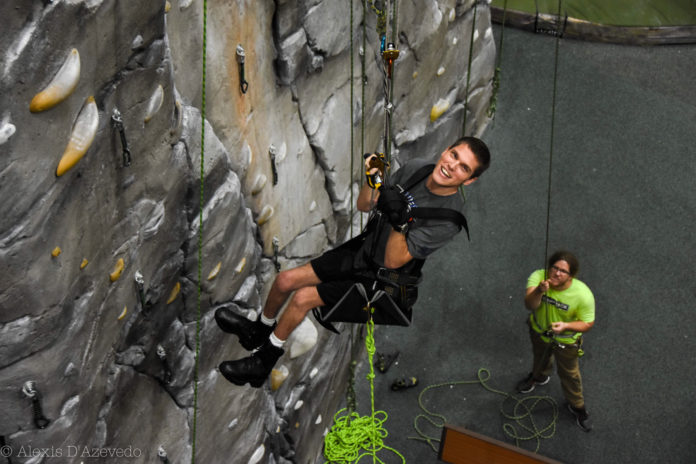
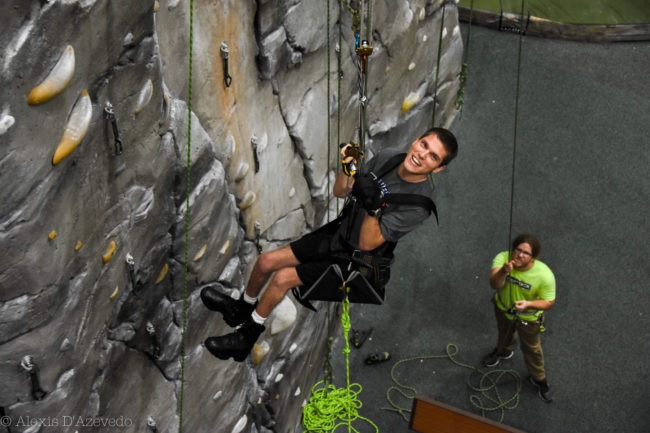
Climbing changes lives. Most climbers have experienced this in some way, whether that is finding new depths and tenacity within yourself, letting climbing bring you to new parts of the world and introduce you to interesting people, or even discovering climbing and then altering your entire life’s trajectory.
What else has changed lives lately? COVID-19 for one. And the pandemic crisis has changed climbing along with it. While there have been encouraging signs of late and 86% of gyms in the latest CWA survey have reopened some or all of their facilities since temporarily closing, the average gym is seeing 44% of their normal revenue. These challenges have left many previously successful businesses uncertain about their financial future. Also affected by these events are climbing nonprofits, which now have less guaranteed support from their donor bases.
In this time of upheaval, the industry has pulled together in so many ways, from gyms sharing best practices to members crowdfunding to keep gyms going and brands directing funds to gyms and organizations in need. One of these stories is the partnership between Paradox Sports and Eldorado Climbing, a business which has remained devoted to a climbing nonprofit and its mission throughout this period.
A Community of Climbers
Paradox Sports is a nonprofit that aims to transform lives through adaptive climbing experiences. This is accomplished through three primary avenues: trips, trainings and local programs. Every year Paradox brings climbers on trips to places such as Yosemite National Park in California, the Gunks in New York, and the Ouray Ice Climbing Park in Colorado. Paradox hosts weekly meet-ups at gyms around the country to foster more local and consistent adaptive climbing communities and offers trainings for gym owners and their employees about how to best serve adaptive climbers in their facilities.
“Just because you have a disability, it doesn’t mean that you’re less capable than other people,” said Shawn Sturges, an Athlete Ambassador for Paradox Sports. “Most people perceive someone with a disability as not equal all the time. Climbing opens people’s perceptions of what someone with a disability can do.”
Paradox was founded by Timmy O’Neil, a professional climber whose brother had an accident that left him paralyzed; Malcolm Daly, the founder of Trango who had an amputation after suffering severe frostbite while climbing in Alaska; and Major DJ Skelton, who served in the military and was injured in Iraq. They saw a need for an organization that provides unique adaptive climbing experiences.
“I was born in South Korea and had cancer. My leg was amputated when I was eight months old. Then I was adopted in America,” said Jessica Sporte, another Athlete Ambassador for Paradox Sports. “I grew up adaptive skiing and playing wheelchair tennis. My first experience rock climbing, I was blown away by the fact that I could just go up to the front desk and borrow the exact same gear everyone else rented. I’ve never had that in any of the adaptive sports I participated in before.”
Though Paradox’s primary offering is climbing, what makes it stand out from other adaptive organizations is its tight-knit community and focus on independence. Participants at Paradox events are taught how to tie in, how to belay, how to lead outside, and how to build anchors. If they didn’t already climb, many participants become independent climbers.
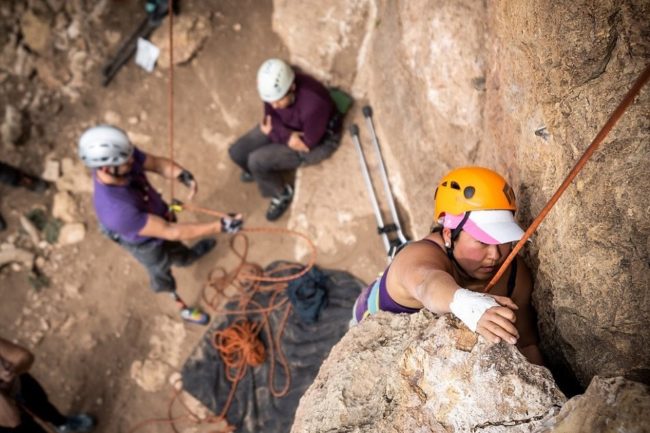
“Paradox sees their participants as climbers first,” Sporte said. “All their lives, people with disabilities are told ‘you can’t walk’ or ‘you can’t run’ or ‘you can’t do that anymore.’ But climbing is unique to each person. It is about learning your own body. Instead of asking, ‘what can’t you do?’ Paradox asks, ‘what can you do?’ That is a huge mental shift.”
Extending beyond climbing, this community allows participants to find new ways of being themselves and helps them feel more comfortable.
“I was born without my hand, but I never really identified as someone with a disability. Before Paradox, I thought people with disabilities were boring and didn’t have adventures, and I’m not like that,” said Maureen Beck, Social Media Coordinator for Eldorado Climbing and also an Athlete Ambassador for Paradox Sports. “I went to my first Paradox event and realized that this is a community of humans. You don’t even know they have disabilities. You forget he’s in a wheelchair or she has one leg. They’re all just climbers. Paradox introduced me to not just the disabled climbing community, but the overall disability community. Now I have this whole great new identity that I didn’t acknowledge until Paradox.”
Climbing and Problem Solving
Climbing is transformative for many people, and its lessons translate into many areas of life. Paradox brings this experience and the lessons that go with it to people who might not have otherwise been exposed to the sport.
“I started losing my eyesight when I was in high school. When I went completely blind at 18, I spiraled into deep depression.” Sturges said. “Then when I started climbing, I noticed that it mirrored my life as a blind individual. I have to problem solve in a lot of different ways, whether it’s crossing a street, getting around a construction site, or going to unfamiliar locations. There’s no one way to do something in climbing. You have to do it the way that your body is able to do it. Climbing gave me confidence to know that it’s okay to fail. It’s okay to find something that doesn’t necessarily work for everyone else. It encouraged me to be a problem solver.”
According to Sturges, the lessons climbing teaches can also be applied to the challenges presented by the pandemic crisis. “When you’re going through something that you’re not sure about, it is scary,” Sturges said.
Right now, people all over the world are grappling with an unsettling sense of uncertainty. One thing that can help during this period is some creative problem-solving to address its challenges.
Challenges in the COVID Era
“COVID-19 has shifted so much for so many, and as a small nonprofit, the challenges really get accentuated for us. We don’t have this huge spectrum for failure,” said Dave Elmore, Executive Director of Paradox Sports. “Our revenue streams have constricted. A lot of what we have relied on in years past has dried up.”
Now Paradox has found itself with less corporate partnerships and less individual donations. Plus, foundations and other organizations managing grants that used to be reliable have redirected funding to the relief efforts. While relief efforts are paramount, a drop in funding equates to less money for operations at the climbing nonprofits which depend on it. Paradox offers most of its programs on a scholarship or subsidized basis, so its revenue is not based on its programing. Less funds means less trips and meet-ups.
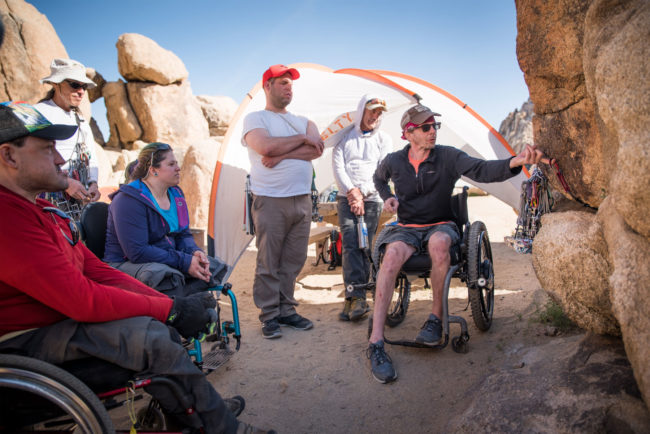
Not everyone has stopped contributing though, and industry partnerships in the COVID era have helped Paradox survive. “Eldo started being a sponsor and donating money to Paradox three years ago, and when we decided to get on board, it was for the long haul,” said Kevin Volz, CEO of Eldorado Climbing.
Based in Colorado, Eldorado Climbing is a climbing wall manufacturer that produces large-scale walls for gyms, universities, and rec centers, in addition to modular DIY walls for homes. “Now [because of COVID-19], I know that Paradox has furloughed their employees. They’ve made huge cutbacks,” Volz said. “How can I help Paradox survive?”
Eldorado Climbing Steps Up
One thing Eldorado Climbing has decided to do is maintain its financial commitment to Paradox regardless of the current economic uncertainty. The company has committed to donating $20,000 in cash to the nonprofit and is sponsoring the creation of Paradox’s yearly fundraising film.
“Eldo is just amazing, to put it simply.” Elmore said. “We couldn’t be more thankful to have them on our side as we navigate COVID. It’s vital to get this support so that we can continue our mission.”
On top of the cash donation, Eldorado Climbing has developed a new revenue stream for Paradox. “Our best-selling product is called the Climbing Slab. It’s a square piece of wood with T-nut holes, and people are putting them in their garages and in their basements,” Volz said. “We have better margins on products, so we’ve committed to donate 5% of top line product sales.”
“You don’t get a lot of people who are proactive and want to create new lines of revenue for you,” Elmore said.
This creative problem solving just might mean that Paradox will have enough funds to weather this tough time―especially if more businesses that believe in Paradox’s mission choose to offer what they can too.
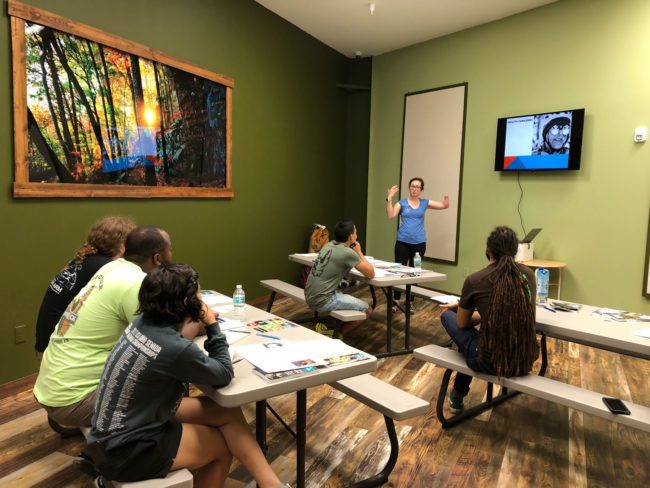
Preserving the Best of Climbing
“By supporting Paradox, it’s not just supporting this one adaptive climbing community. It is opening your doors to everybody that has a disability. It’s showing all people that they have a home in your facility,” said Beck. According to Beck, that emphasis on community is important for business too. “Gyms that are built for the whole community…are the gyms that are doing better, especially in the COVID environment,” Beck said.
When stay-at-home orders were enacted and community hubs such as gyms closed down, many people experienced a sense of isolation. But an enduring sense of community has played a role in keeping the industry going during the pandemic crisis, with some members even continuing their memberships while their gym is closed for climbing. And when climbers return to the gym, community is one of the key reasons for doing so. These values are furthered through organizations like Paradox Sports.
“Our mission transcends climbing,” Elmore said. “Climbing is the vehicle for building community, building support networks, building self-reliance, building positive mental health.”
“We hope our partnership with Paradox Sports can serve as a model for the rest of the industry and an encouraging reminder to do what we can to save the best aspects of climbing,” said Volz. “Now, more than ever, is the time to work together to promote these attitudes and to welcome everyone.”
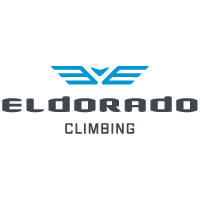
Eldorado Climbing has been building climbing walls since 1991 and offers a vast array of wall products: custom gym walls, artisanal concrete for outdoors, do-it-yourself and artistic panels, backyard boulders, modular climbing walls, Crax, Kinetix Action Towers, the Eldo Board and more. Proudly paying it forward to 1Climb, Paradox Sports and the Boulder Climbing Community.





